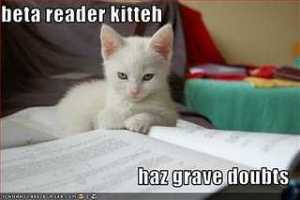Welcome to my weekly rumination on all things writing. 🙂 This week, I’m in the midst of beta reading several works for an anthology I’m involved in. I’ve only been beta reading for a year or so, though I was critiquing stories long before that.
But it got me thinking. What are the things you need to do to be a great beta reader? Here are my thoughts:
1) Ask the Author What They Want: This is the most important, because it sets the ground rules. Some authors want just a high level storyline critique – does the plot make sense? Do things move along well? Are there any continuity issues?
Others want a much deeper edit – is the grammar right? Are there any typos? Does the text itself flow well?
And it can vary from manuscript to manuscript, even for the same author – a third draft will (hopefully) need a lot less work than a first draft.
So start out by asking the author about the scope of the edit, and agree on this before you get started. Then you won’t turn in a manuscript that’s been cut to shreds, when the author only wanted to know if the main character was likable.
2) Be Realistic About Your Time: You’ve just gotten a new story from your author friend for a beta read. You’re excited, and you want to get it back to them as soon as possible. That’s ok. It’s a natural impulse. But no one will be happy if you set yourself too tight a deadline and fail to meet it.
So figure out your beta pace. How long is the story? How many words can you do in a day? It’s the same process as when you’re writing to a deadline. Then set a finish date that won’t kill you.
3) Don’t Rewrite the Author’s Style: This was a big temptation for me when I first started. “Oh, I know how to say that better”, I’d think, and off I went, changing sentence structures all over the page.
Don’t get me wrong – some folks may want this (see point 1) but unless they have specifically requested it, steer clear of this temptation.
If there is something you really think is an issue, add a note along with your suggestion and why you feel it should be changed. But don’t change the actual text.
4) Don’t Slice Out Whole Sections of Text: Sometimes you’re reading a story, and it occurs to you that a paragraph, a scene, or an entire chapter really isn’t needed.
I cannot say this strongly enough: DO NOT CUT THIS TEXT OUT OF THE MANUSCRIPT.
Remember, the manuscript you have in your bloodthirsty hands is the author’s baby. Start cutting out sections wholesale, and many authors will react as if you cut off their children’s fingers or toes. Sure, one may not NEED little toes, but believe me, people have grown attached to having them.
Instead, explain in a note why you think the text may not be necessary, and then let the author make the final call.
5) Be Careful With Humor: I’ve beta’d for a number of authors in the last year. With some, a little humor helps leaven the criticism. But others may see it as an affront to their writing style or ability.
There’s no way to know on this one in advance, so for your first time betaing for a new author, go light on the humor, and see how it goes.
6) It’s The Author’s Story: This one is really important too. Every time I critique or beta a story, I include this statement:
“But remember – this is your story, and you know it best. Please use what makes sense, and throw away the rest.”
Yeah, I know this sounds obvious, and we all should already know it. But including those two little sentences gives the power back to the author, and indicates that you won’t have a problem if they reject some (or all) of your suggestions.
Because authors really are a sensitive bunch, when it comes right down to it. I should know.
*checks manuscript that just came back from beta read*
“What do you mean I need to cut the whole first scene???”
 Scott (on the left, with husband Mark) has been writing since elementary school, when he and won a University of Arizona writing contest in 4th grade for his first sci fi story (with illustrations!). He finished his first novel in his mid twenties, but after seeing it rejected by ten publishers, he gave up on writing for a while.
Scott (on the left, with husband Mark) has been writing since elementary school, when he and won a University of Arizona writing contest in 4th grade for his first sci fi story (with illustrations!). He finished his first novel in his mid twenties, but after seeing it rejected by ten publishers, he gave up on writing for a while.
Over the ensuing years, he came back to it periodically, but it never stuck. Then one day, he was complaining to Mark, his husband, early last year about how he had been derailed yet again by the death of a family member, and Mark said to him “the only one stopping you from writing is you.”
Since then, Scott has gone back to writing in a big way, finishing more than a dozen short stories – some new, some that he had started years before – and seeing his first sale. He’s embarking on a new trilogy, and also runs the Queer Sci Fi site, a support group for writers of gay sci fi, fantasy, and supernatural fiction.

